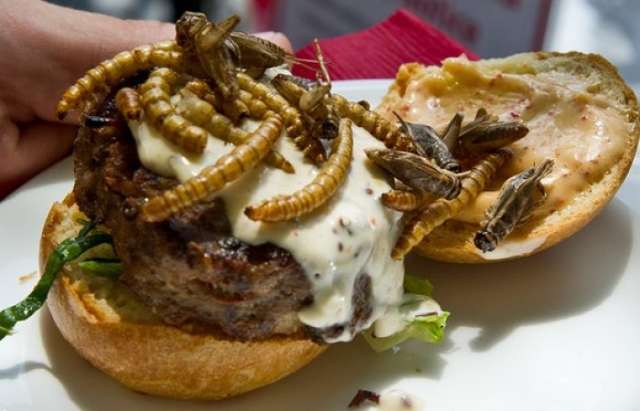Globally, twice as much land is used to raise cattle, pigs and other animals than is used to grow crops. Furthermore, a third of those crops harvested are fed back to livestock. The new research is the first systematic comparison of the environmental impact of various sources of food, and found that imitation meat and insects are vastly more efficient than raising livestock.
The work, published in the journal Global Food Security, found that if half of traditional animal products were replaced by imitation meat or insects the land required to produce the world’s food would be slashed by a third. However, the researcher found that another alternative – lab-grown meat – did not show such big advantages.
Peter Alexander, at the University of Edinburgh in Scotland and who led the new research, acknowledges that eating insects is a challenging idea in western nations. But more than 2,000 species of insects are eaten by people across 119 nations today, including crickets and mealworm larvae.
“It is very widespread, especially in Asia, and not seen as unusual in those cultures,” said Alexander. “We are not trying to mandate or even suggest some policy that you eat insects every day [but] our work indicates the potential benefits that are there.” The researchers also note that foods can become acceptable that were once shunned, as the tomato was in Europe for two centuries and as lobster was in the US.
Imitation meat, such as tofu and textured vegetable protein, has in the past been limited in its appeal. But the area is now seeing significant innovation, with products such as the Impossible burger promising the same taste as real meat.
Alexander said it is crucial to tackle the world’s growing appetite for meat. “The developing world is eating more meat as they can afford to do so. That really is a concerning trend if it continues,” he said. “If everybody eats meat like an American does currently, then it’s going to be very difficult to sustain. With current production practices, more than the entire area of the planet would be required.”
The ideal solution is a global convergence on modest meat consumption, he said: “The west needs to eat less meat – though not none, I am not in favour of global vegetarianism – while allowing other countries with relatively low meat consumption to increase theirs.”
High levels of meat consumption are also known to damage people’s health, by contributing to obesity, heart disease and cancer, and a recent study showed that climate taxes on meat and milk would save 500,000 lives a year as well as cutting carbon emissions.
“Even doing everything we can to reduce the emissions associated with meat production, rising demand means livestock emissions would take us beyond the global objective of 2C,” said Rob Bailey, research director for energy, environment and resources at Chatham House. “Therefore dietary change is a precondition for avoiding catastrophic climate change.”
Bailey said assessing the land requirements of different strategies was important: “Competition for land will increase in the future, so we have to find ways to feed a growing population without expanding agriculture further into forests.”
He said simply eating less meat, rather than substitutes, cuts environmental impacts the most. “We shouldn’t forget that the average British person eats two to three times more meat than is good for them, so this makes sense from both an environmental and a health perspective.” But he acknowledged this may not be easy and said the production of lab-grown meat was likely to become more efficient in future.
Government and campaign groups have had little appetite for tackling the overconsumption of meat, but Alexander said awareness of the issue is growing rapidly, though action is slow. “We are moving slowly in the right direction,” he said. “There is some cause for optimism but equally some cause for pessimism. It depends what side of the bed I get out of.”
More about: #eating-insects
















































